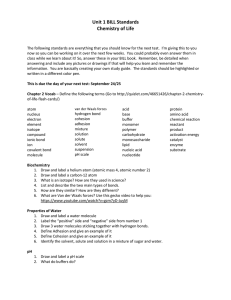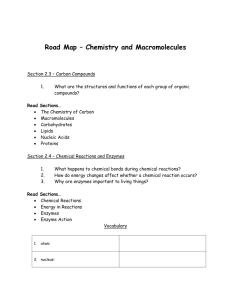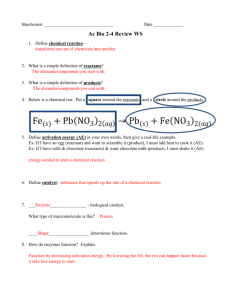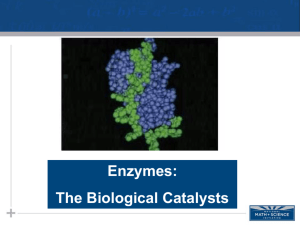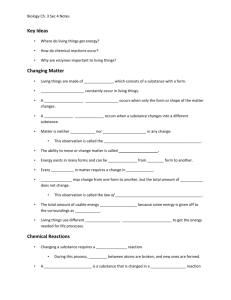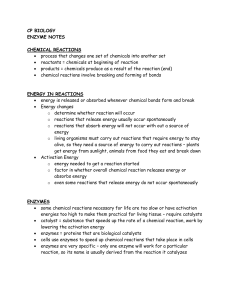Chemical Reactions
advertisement
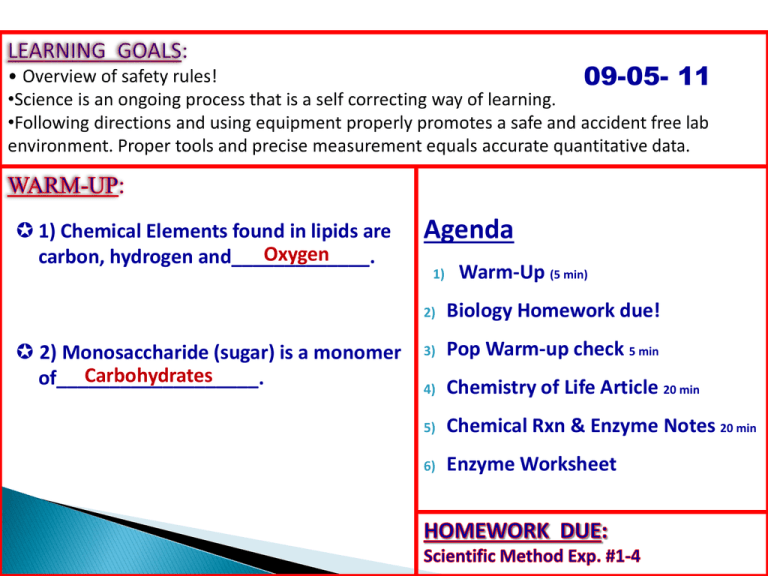
09-05- 11 1) Chemical Elements found in lipids are Oxygen carbon, hydrogen and_____________. 2) Monosaccharide (sugar) is a monomer Carbohydrates of___________________. Agenda 1) Warm-Up (5 min) 2) Biology Homework due! 3) Pop Warm-up check 5 min 4) Chemistry of Life Article 20 min 5) Chemical Rxn & Enzyme Notes 20 min 6) Enzyme Worksheet Scientific Method: Experiments #1-4 DUE!! Show me the warm-up from August 30, 2011 Biomolecule: molecules that are important for our bodies to function. Monomer: small molecule Polymer: large molecule Biochemistry: chemical reactions that occur inside of our bodies 1. 2. 3. 4. 5. 6. Observation Hypothesis Experimentation Conclusion Theory Inference 7. Metric System 8. Controlled Experiment 9. Biomolecule 10.Monomer 11.Polymer 12.Biochemistry As we have seen living things are made of chemical compounds, but more importantly chemistry isn’t just what life is made of, chemistry is also what life does. Chemical reaction – is a process that changes one set of chemicals into another set of chemicals. The elements or compounds that enter into a chemical reaction are the reactants. The elements or compounds produced by a chemical reaction are known as products. Ex) photosynthesis Chemical reactions always involve the breaking of bonds in reactants and the formation of new bonds in products. Energy is neither created nor destroyed, therefore energy is released or absorbed whenever chemical bonds form or are broken. Chemical reactions that release energy often occur spontaneously. Chemical reactions that absorb energy will not without a source of energy. Ex) 2H2 + O2 yields 2H20 The reverse reaction takes an electrical current through water to decompose water into hydrogen and oxygen gas. What significance do these energy changes have to do with living things? In order to stay alive, organisms need to carry out reactions that require energy. Do all reactions occur spontaneously? If this were true what would happen to your textbooks? Will wood burn only if you light it with a match. Chemists call the energy that is needed to get a reaction started the activation energy Fig 2 – 19 shows, activation energy is a factor in whether the overall chemical reaction releases energy or absorbs energy. Some chemical reactions that make life possible are too slow or have activation energies that are too high to make them practical for life. These reactions require catalysts or substances that speed up the rate of a chemical reaction. Catalysts work by lowering a reaction’s activation energy. Enzymes – are proteins that act as biological catalysts. Enzymes speed up chemical reactions that take place in cells. Enzymes are very specific, generally catalyzing only one chemical reaction. For a chemical reaction to occur, the reactants must collide with enough energy so that existing bonds will be broken and new bonds will be formed. Enzymes provide a place where reactants can be brought together to react. The reactants of enzyme – catalyzed reactions are known as substrates. Fig 2 – 21 provides an example of an enzyme – catalyzed reaction. During the reaction, a phosphate group is transferred from ATP to the glucose molecule. Each protein (enzyme) has a specific shape, the substrate binds to the active site on the protein to help speed up the reaction. AKA “lock and key” Because they are catalysts for reactions, enzymes can be affected by any variable that influences a chemical reaction. Many enzymes are affected by temp, pH, etc. •Label each fold Protein, Carbohydrate, Lipid, Nucleic acid •6 info. Strips (functions, chemical makeup, monomers, examples, special properties, and pics) Use your biomolecule “notes” to match each info. box to its correct biomolecule. Cut out each box and paste in correct flap. Do this with each info. strip ◦ functions, chemical makeup, monomers, examples, special properties, and pics When your done, color and decorate Turn in & start on homework Best foldables will be displayed DUE TODAY: • Chemistry of Life Article • Enzyme Notes (KEEP) • Enzyme WS “The most powerful weapon on earth is the human soul on fire.” Ferdinand Foch DUE NEXT CLASS: • BRING BIO. BOOK
